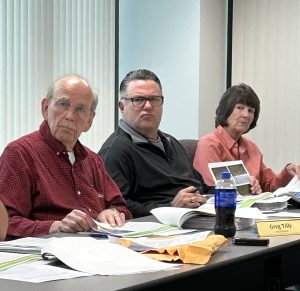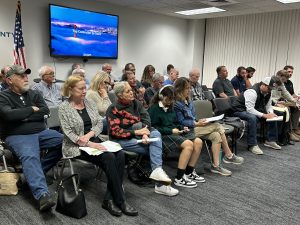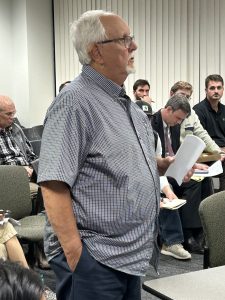Residents oppose proposed solar farm
By Lynne Conner For Chronicle Media — October 25, 2024
Winnebago County Zoning Board of Appeals members (from left) Greg Tillly, Ernie Fuhr and Janet Klinger listen to testimony about a proposed solar farm in northwest Winnebago County. (Photo by Lynne Conner/for Chronicle Media)
First of three stories on a proposed Winnebago County solar farm
A proposal to build a 75-acre solar farm in northwest Winnebago County hit a snag when the Winnebago County Zoning Board of Appeals voted 5-1 against the plan.
Many neighbors along Kilburn Avenue and Tate and Blacklaws roads gathered at the Oct 9 Zoning Board of Appeals meeting in opposition to the project.
Some expressed concerns about construction, water drainage, impact on neighboring agricultural land, devaluing of neighborhood property and the broader issue of increased solar farms in the region and on rich farmland throughout Illinois.
“I have heard about solar farms decreasing property values and causing noise, dust pollution and disruption to existing properties,” said Judy Cook, who lives directly across the street. “I am worried about the glare and heat solar farms generate and what happens if New Leaf Energy goes bankrupt. Who will take over the solar farm, and how will it be managed?”
The property, located at 5150 Tate Road, is owned by Myers Family Farms, LP, of Leaf River, and is bordered by Blacklaws Road on the north and Tate Road on the east. Both residential and family-owned farm properties border the solar farm on the south and west.
The county sent some neighbors advance notice of the solar farm site approval request meeting, but others claimed they were not informed. Neighbor John Vaughn distributed a packet of information to homes near the proposed solar farm site on Oct. 4. Myers Family Farms representatives did not attend the session.
The Tate Road solar farm is a project of New Leaf Energy, a renewable energy company whose developers distributed an informational packet to Zoning Board of Appeals members and Tate Road neighbors. Various aspects of the project were addressed, including construction, impacts on the existing landscape, operations and maintenance and the plan for decommissioning.

Concerned Tate Road neighbors gather at the Winnebago County Zoning Board of Appeals meeting to express their opposition to a proposed solar farm. (Photo by Lynne Conner/for Chronicle Media)
According to the U.S. Energy Information Administration, solar energy accounted for 1.1 percent of the total energy generated in Illinois in 2023. Energy from nuclear power is the largest source of energy in the state at 54.9 percent, with energy from natural gas and coal ranking second and third at 15.9 percent and 15.3 percent, respectively. Illinois is the largest producer of nuclear energy in the U.S.
Solar farms use sunlight that hits solar panels to generate direct current voltage and convert it into alternating current power to match the electrical distribution network. This power feeds directly into pad-mounted interconnection equipment, which connects to Commonwealth Edison distribution lines.
The rapid growth and expansion of solar farms in rural areas across the state, including Winnebago County, is Vaughn’s greatest concern.
Vaughn cited a provision in the Illinois Counties Code which states, “… the County may not adopt zoning regulations that disallow, permanently or temporarily commercial solar energy facilities from being developed or operated in any district zoned to allow agricultural or industrial uses …”

John Vaughn speaks at the ZBA meeting on the proposed Tate Road solar farm. (Photo by Lynne Conner/for Chronicle Media)
“As a result of this law, we are losing around half of a million acres of farmland statewide,” Vaughn said. “There is a concern that the loss of this farmland could lead to the closure of ethanol plants that rely on corn to produce fuel. Furthermore, an absentee landlord owns the property on which the solar farm is proposed. I associate this landlord’s actions with absentee landlords in the City of Rockford who buy properties, rent them out, run them down, take the money, and leave them sitting.”
Vaughn also cited ecological issues connected with solar farming.
“I’m concerned about changing the water drainage on the proposed solar farm site,” he said. “Are you going to utilize the creek on the northeast corner? Where is the drainage going to go?”
New Leaf Energy reps said that a 100-foot buffer would be built to protect the wetlands and that runoff from the solar panels is not dangerous. Many other Tate Road neighbors who spoke at the meeting also expressed concerns over soil and groundwater safety if a solar panel is damaged by severe weather, wind and hail.
Nick Bellone, a civil project engineer with New Leaf Energy, addressed Vaughn’s question.
“We’re not proposing any drainage as the project is underneath the threshold of detention, which is 25,000 square feet. We’re converting the site to a meadow, which should reduce runoff.”
Vaughn pointed out that the solar panels and shallow meadow plants wouldn’t absorb water like a corn crop and asked about any grading to the site. Bellone responded that the solar site would “use the same topography” that the land currently has.
Jim Sohner farms property that borders the site and has multiple concerns about the detrimental effects on his land and water.
“I farm on two sides of the proposed solar project and know the land well. I’m extremely concerned that the solar site includes a wetland, and all that water drains to the north into that wetland,” he said. “I believe that solar panels will create much more runoff than if the land continues to be farmed with no-till practices creating minimal runoff.”
According to Bellone, the solar panels for the Tate Road site are framed with aluminum and made of glass, plastic, silicone, silver and a mix of other metals, including copper and lead. He said that the solar site would be monitored, and the company would receive an alert in the event of damage to the panels. However, Bellone added that the time between the initial alert and repairs to the damaged solar panels could be anywhere from one to three days.
The informational packet provided by New Leaf Energy stated that agricultural wire fencing and trees would screen the project area’s northern, eastern and southern perimeters. The solar farm construction would occur over four to six months, and various types of trucks would deliver materials to the site between 7:30 a.m. and 5 p.m. daily.
New Leaf reps added that a bond posted with Winnebago County provides funding to remove the solar farm if New Leaf Energy should declare bankruptcy.
Cheryl Hochstetler is against the project, highlighting safety and economic concerns.
“We’ve had much drought this summer, and I’m extremely worried about overheated solar panels dropping molten electronics on dry grass and causing fires,” she said.
Hochstetler cited two grass fires caused by overheated panels that destroyed 11 acres in Eagle Point, Oregon, earlier this year. “Solar panels cannot be de-energized by the flip of a switch. If the sun is shining, electricity is produced, there’s no off switch for the panels,” she said.
“The majority of solar panels are manufactured in foreign countries. The U.S. bolsters foreign economies by granting them federal tax credits for industrial solar projects,” Hochstetler said. “American taxpayers subsidize the profits of overseas developers through these federal tax credits. It’s time to demand our tax dollars be invested in energy projects that benefit America’s economy.”
According to New Leaf Energy representatives, the solar panels used in their projects are manufactured in Vietnam.
Pat Curran, the owner of Curran’s Orchard on Kilburn Avenue, has been approached by solar energy companies interested in his property.
“I have run my family’s business for over 40 years, and just like my neighbors, I have become part of the land, and the land has become part of me. My grandson will take over the business when I retire,” he said.
“I think the fools in Springfield made a terrible mistake by allowing solar farms on agricultural properties with no restrictions. They should be ashamed of themselves.”
“I have received offers from solar companies guaranteeing $4,000 income per acre for 20 years, and I wouldn’t have to do a thing. It’s easy money,” he said. “I asked my grandson if he would take that offer or any others, and he said, ‘No, never.’ Do you know what’s great about that? Now, he’s become part of the land, and the land has become part of him.”
Richard Comstock emphasized the long-standing dedication to crop farming he and his neighbors share.
“I own land on either side of the proposed solar farm, which has been in my family since 1884. The Sohner family has farmed this land since 1868. My son is the fifth generation to farm this property, so the disruption a solar farm would bring hits close to home.”
Some Zoning Board of Appeals members voiced several concerns about the project, including maintenance of the site, noise levels, a fire protection plan, and vague protocol for site decommissioning.
At the meeting’s conclusion, members David Daly, Greg Tilly, Tami Verstrate, Ernie Fuhr and Janet Klinger voted against the site approval request. Brian Erickson cast the sole vote in favor.







